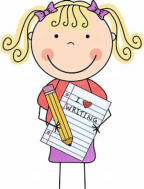EMAILS
Enquiries: info@thamesvalleywriterscircle.org
© Thames Valley Writers’ Circle
Created with Xara Designer Pro+
Young children often write poetry with enthusiasm and spontaneity. Words
they don’t even know the meaning of. Their minds are not cluttered as ours
are by all we have ever learned about it. So let’s go back to the beginning.
Forget about all the clever stuff. Forget about rules – there aren’t any, but
there are guidelines.
Most poets are not academics, and neither are the people who hear or read
them. They are just individuals with something to say.
Aim to express yourself. The whole business of writing poetry can be taken
too seriously. Start by writing for fun.
A poem says, ‘look’. A good poem has some space in it for the reader. It will
mean different things to different people.
Writing Poetry
Look through the list of first lines in the back of a poetry book. Select a line that
interests you. Use that line as the first line of your poem, and when you have
finished your poem, get rid of the first line.
Are you interested in history? Is their someone who stands out, someone who
triggers your emotions? (I have a book of reportage and have found it useful when
looking for ideas. It has triggered a few of my war poems.)
The quickest way to stimulate your memory is by smell. Spice, for example, may
take you back to Christmas. Boot polish, a memory of your childhood or when you
were in the army. A perfume that you used to wear when you were younger.
Write a ‘what if’ poem. Think of something that is unlikely.
Write about something as if you were seeing it for the first time.
Imagine yourself younger, or older.
Write a poem about sleep or sleeplessness.
Write a love poem about an object you really love or have loved. Show us you love
it but, as with all emotions, the word ‘love’ should not be mentioned.
There is a poem by Niall Rollinson called ‘My Father Shaving Charles Darwin’
(humorous). Choose a relative and a famous person and write a poem.
There is a fire, and you can take only one thing with you. What would it be?
Choose a personal object and write about it so that emotion filters through the
object.
Write a sentence. Change the noun to something else that makes sense but is
more unusual or unexpected. Use this line to begin a poem.
Write a poem about an imaginary journey.
Is it a good first line/title? Will it hook the reader?
If the poem rhymes, does the rhyming ever become more important than what you are
trying to say? Do the rhymes fit in comfortably or do they stand out and draw attention
to themselves?
Take a look at the adjectives and adverbs. Cut out any that are unnecessary. Is there a
better noun or verb that could be used that would make the adjective or adverb no
longer necessary?
Cut out any other unnecessary word. Does it improve or spoil the flow of the words? It is
your poem, do what you think best.
Are your line breaks in the right places?
Have you started a new stanza for the right reason?
Writing ‘you’ in a poem can be a problem. The reader may be annoyed if you assume
that they agree with your thoughts and ideas. You can lose the reader’s sympathy. ’We’
is also a problem for the same reason
Is it an angry poem? If so, try taking out the punctuation and see if this improves it.
As in all creative writing, you should show, not tell.
Avoid abstractions in your poems. (Chekhov said ’Cut out all those pages about
moonlight. Show us the moon’s reflection in a piece of broken glass.)
Does the poem ring true? The impulse or emotion behind the poem should be true,
even if the facts are made up.
Use everyday modern language.
Don’t be vague.
Don’t underestimate your readers’ intelligence. He/she can read between the lines as
well as you, so don’t hammer your point home.
Avoid sentimentality. You don’t want people to feel they are being manipulated.
Sometimes it takes a while to get into the swing of a poem and sometimes you write an
ending which is only reinforcing what has already been said. So, could a poem be
improved by topping and/or tailing it?
Is the imagery convincing?
Has it got a good title, or could it be improved?
Don’t use borrowed language. Don’t be poetic. Aim for truth and directness. Say what
you truly think in words not too removed from ordinary speech. Keep it simple.
Today, the poet’s business is to be honest and avoid irrelevance.
Some ideas that may help you get started
The Guidelines





EMAILS
Enquiries: info@thamesvalleywriterscircle.org
© Thames Valley Writers’ Circle
Created with Xara Designer Pro+
Young children often write poetry with enthusiasm
and spontaneity. Words they don’t even know the
meaning of. Their minds are not cluttered as ours
are by all we have ever learned about it. So let’s
go back to the beginning. Forget about all the
clever stuff. Forget about rules – there aren’t any,
but there are guidelines.
Most poets are not academics, and neither are the people who
hear or read them. They are just individuals with something to
say.
Aim to express yourself. The whole business of
writing poetry can be taken too seriously. Start
by writing for fun.
A poem says, ‘look’. A good poem has some
space in it for the reader. It will mean different
things to different people.
Writing Poetry
Look through the list of first lines in the back of a poetry book.
Select a line that interests you. Use that line as the first line of
your poem, and when you have finished your poem, get rid of
the first line.
Are you interested in history? Is their someone who stands out,
someone who triggers your emotions? (I have a book of
reportage and have found it useful when looking for ideas. It
has triggered a few of my war poems.)
The quickest way to stimulate your memory
is by smell. Spice, for example, may take
you back to Christmas. Boot polish, a
memory of your childhood or when you
were in the army. A perfume that you used
to wear when you were younger.
Write a ‘what if’ poem. Think of something that is unlikely.
Write about something as if you were seeing it for the first time.
Imagine yourself younger, or older.
Write a poem about sleep or sleeplessness.
Write a love poem about an object you
really love or have loved. Show us you love
it but, as with all emotions, the word ‘love’
should not be mentioned.
There is a poem by Niall Rollinson called
‘My Father Shaving Charles Darwin’ (humorous). Choose a
relative and a famous person and write a poem.
There is a fire, and you can take only one thing with you. What
would it be?
Choose a personal object and write about it so that emotion
filters through the object.
Write a sentence. Change the noun to something else that
makes sense but is more unusual or unexpected. Use this line
to begin a poem.
Write a poem about an imaginary journey.
Some ideas that may help you
get started
Is it a good first line/title? Will it hook the
reader?
If the poem rhymes, does the rhyming ever
become more important than what you are
trying to say? Do the rhymes fit in comfortably
or do they stand out and draw attention to themselves?
Take a look at the adjectives and adverbs. Cut out any that are
unnecessary. Is there a better noun or verb that could be used
that would make the adjective or adverb no longer necessary?
Cut out any other unnecessary word. Does it improve or spoil
the flow of the words? It is your poem, do what you think best.
Are your line breaks in the right places?
Have you started a new stanza for the right reason?
Writing ‘you’ in a poem can be a problem. The reader may be
annoyed if you assume that they agree with your thoughts and
ideas. You can lose the reader’s sympathy. ’We’ is also a
problem for the same reason
Is it an angry poem? If so, try taking out the punctuation and
see if this improves it.
As in all creative writing, you should show, not tell.
Avoid abstractions in your poems. (Chekhov said ’Cut out all
those pages about moonlight. Show us the moon’s reflection in
a piece of broken glass.)
Does the poem ring true? The impulse or emotion behind the
poem should be true, even if the facts are made up.
Use everyday modern language.
Don’t be vague.
Don’t underestimate your readers’ intelligence. He/she can
read between the lines as well as you, so don’t hammer your
point home.
Avoid sentimentality. You don’t want people to feel they are
being manipulated.
Sometimes it takes a while to get into the swing of a poem and
sometimes you write an ending which is only reinforcing what
has already been said. So, could a poem be improved by
topping and/or tailing it?
Is the imagery convincing?
Has it got a good title, or could it be improved?
Don’t use borrowed language. Don’t be poetic. Aim for truth
and directness. Say what you truly think in words not too
removed from ordinary speech. Keep it simple.
Today, the poet’s business is to be honest and avoid
irrelevance.
The Guidelines







Poetry




























